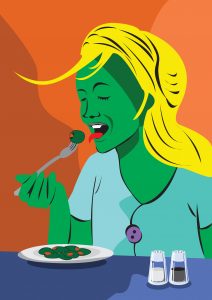Mind Your Body TV Episode 15 with Tricia Greaves.
Sing along with me now: “You might as well face it, you’re addicted to [food].” That’s not exactly how Robert Palmer’s signature 1986 hit song went, but you get the idea if you want to stop emotional overeating.
Approximately one-third of U. S. adults are obese. According to a LifeGoesStrong.com poll, nearly 36 percent of baby boomers are obese and obese Medicare beneficiaries are estimated to cost 34 percent more than their non-obese/overweight peers.
The Centers for Disease Control & Prevention (CDC) remind us that obesity-related conditions include heart disease, stroke, type 2 diabetes and certain types of cancer, some of the leading causes of death. Many are eating themselves to death and it’s not because they’re always hungry. It’s food addiction, when they can’t stop emotional overeating.
Theories as to “why” abound. For example, in a 2009 study: “…A possible explanation for overeating is that processed foods with high concentrations of sugar and other refined sweeteners, refined carbohydrates, fat, salt, and caffeine are addictive substances. Therefore, many people lose control over their ability to regulate their consumption of such foods.” Another from 2010: “Recent findings have strengthened the case for food addiction.”
Stop emotional overeating in the name of health
In other words, food addicts, like other addicts, start but can’t stop emotional overeating. Overeaters Anonymous lists the following “symptoms” of unusual food behaviors:
- obsession with body weight, size and shape
- eating binges or grazing
- preoccupation with reducing diets
- starving
- laxative or diuretic abuse
- excessive exercise
- inducing vomiting after eating
- chewing and spitting out food
- use of diet pills, shots and other medical interventions to control weight
- inability to stop eating certain foods after taking the first bite
- fantasies about food
- vulnerability to quick-weight-loss schemes
- constant preoccupation with food
- using food as a reward or comfort
When food is not your friend
The Mayo Clinic says: “You may turn to food for comfort — consciously or unconsciously —when you’re facing a difficult problem, stress or just looking to keep yourself occupied.” Additionally, says the clinic, factors like unemployment, financial pressure, health problems, relationship conflicts, work stress, bad weather and fatigue may prompt eating when eating isn’t the answer. In other words, life is often at the root of addictive behaviors like emotional eating.
Watch my video here with former emotional overeater Tricia Greaves, president of The Nelson Center for Emotional Healing in Los Angeles. She’ll explain why baby boomers don’t have to let emotional overeating eat away at self-esteem, success and ultimately, longevity. Also don’t miss Greaves’ other video with Mind Your Body TV here as she explains why you have addictions and how you can ditch them with determination and commitment.
+++++++++++++++++++++++++++++++++++++++++++++++++++++++++++++++++++++
(Photo courtesy: © Stiven | Dreamstime.com)
